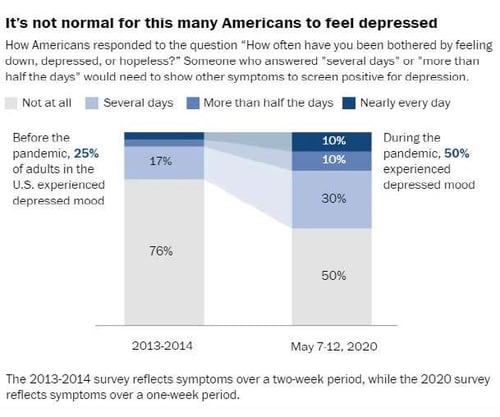Mental health has become an increasing concern six months into the COVID-19 pandemic in the United States. According to the American Medical Association, “at least 30 states are reporting spikes in fatal opioid overdoses and ongoing concern about mental illness or substance abuse disorders, all in connection with COVID-19.” One-third of Americans are reporting severe anxiety. This follows a pattern similar to what happened when the SARS pandemic hit Hong Kong in 2003. Clinicians found that 40% of SARS survivors had PTSD and/or depression for up to four years after the pandemic subsided.
For employers, creating a support network to help employees and their families address mental health issues will be valuable to all. In addition to the human toll, depression and anxiety have a significant impact on the economy and workplace productivity. The World Health Organization estimates that anxiety and depression disorders cost the global economy $1 trillion in lost productivity in a typical year; that number is surely higher in a pandemic. The WHO study also found workplaces that address mental health issues are more likely to reduce absenteeism and have higher productivity.
Employees are dealing with unprecedented levels of stress due to their health and safety concerns, isolation, financial strain, and childcare responsibilities including virtual learning and other uncertainties surrounding schooling. Dual-income families struggle to juggle their work schedules with parenting duties. According to a study done by Human Resource Executives, employees say dealing with the pandemic has been the most stressful time in their careers – even more so than events like September 11th and the 2008-2009 Recession. The study also found that 65% of employees do not feel that their employer offers benefits or programs to support or improve their well-being. When an EAP program is present, only about 10% of employees utilize it.
Employee Assistance Programs (EAPs) can be an important strategy for easing employee stress. Employers with EAPs should consider strategies to promote them and encourage employee engagement. Employers that do not have EAPs could consider informal support groups and listening sessions with their employees. They may also want to consider establishing an EAP in the coming year, but in doing so should make sure it provides strong mental health counseling.Washington Post Sources:
- https://www.washingtonpost.com/health/2020/05/26/americans-with-depression-anxiety-pandemic/?arc404=true
- https://hrexecutive.com/will-covid-finally-make-employers-fix-their-mental-health-problem/
- https://www.who.int/mental_health/in_the_workplace/en/
COMMENTS